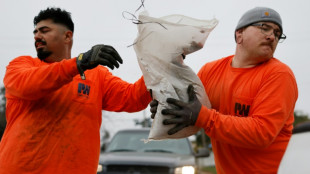
-
 Spurs captain Romero facing increased ban after Liverpool red card
Spurs captain Romero facing increased ban after Liverpool red card
-
Bolivian miners protest elimination of fuel subsidies

-
 A lack of respect? African football bows to pressure with AFCON change
A lack of respect? African football bows to pressure with AFCON change
-
Trump says comedian Colbert should be 'put to sleep'

-
 Mahrez leads Algeria to AFCON cruise against Sudan
Mahrez leads Algeria to AFCON cruise against Sudan
-
Southern California braces for devastating Christmas storm

-
 Amorim wants Man Utd players to cover 'irreplaceable' Fernandes
Amorim wants Man Utd players to cover 'irreplaceable' Fernandes
-
First Bond game in a decade hit by two-month delay

-
 Brazil's imprisoned Bolsonaro hospitalized ahead of surgery
Brazil's imprisoned Bolsonaro hospitalized ahead of surgery
-
Serbia court drops case against ex-minister over train station disaster

-
 Investors watching for Santa rally in thin pre-Christmas trade
Investors watching for Santa rally in thin pre-Christmas trade
-
David Sacks: Trump's AI power broker

-
 Delap and Estevao in line for Chelsea return against Aston Villa
Delap and Estevao in line for Chelsea return against Aston Villa
-
Why metal prices are soaring to record highs

-
 Stocks tepid in thin pre-Christmas trade
Stocks tepid in thin pre-Christmas trade
-
UN experts slam US blockade on Venezuela

-
 Bethlehem celebrates first festive Christmas since Gaza war
Bethlehem celebrates first festive Christmas since Gaza war
-
Set-piece weakness costing Liverpool dear, says Slot

-
 Two police killed in explosion in Moscow
Two police killed in explosion in Moscow
-
EU 'strongly condemns' US sanctions against five Europeans

-
 Arsenal's Kepa Arrizabalaga eager for more League Cup heroics against Che;sea
Arsenal's Kepa Arrizabalaga eager for more League Cup heroics against Che;sea
-
Thailand-Cambodia border talks proceed after venue row

-
 Kosovo, Serbia 'need to normalise' relations: Kosovo PM to AFP
Kosovo, Serbia 'need to normalise' relations: Kosovo PM to AFP
-
Newcastle boss Howe takes no comfort from recent Man Utd record

-
 Frank warns squad to be 'grown-up' as Spurs players get Christmas Day off
Frank warns squad to be 'grown-up' as Spurs players get Christmas Day off
-
Rome pushes Meta to allow other AIs on WhatsApp

-
 Black box recovered from Libyan general's crashed plane
Black box recovered from Libyan general's crashed plane
-
Festive lights, security tight for Christmas in Damascus

-
 Zelensky reveals US-Ukraine plan to end Russian war, key questions remain
Zelensky reveals US-Ukraine plan to end Russian war, key questions remain
-
El Salvador defends mega-prison key to Trump deportations

-
 Stranger Things set for final bow: five things to know
Stranger Things set for final bow: five things to know
-
Grief, trauma weigh on survivors of catastrophic Hong Kong fire

-
 Asian markets mixed after US growth data fuels Wall St record
Asian markets mixed after US growth data fuels Wall St record
-
Stokes says England player welfare his main priority

-
 Australia's Lyon determined to bounce back after surgery
Australia's Lyon determined to bounce back after surgery
-
Stokes says England players' welfare his main priority

-
 North Korean POWs in Ukraine seeking 'new life' in South
North Korean POWs in Ukraine seeking 'new life' in South
-
Japanese golf star 'Jumbo' Ozaki dies aged 78

-
 Johnson, Castle shine as Spurs rout Thunder
Johnson, Castle shine as Spurs rout Thunder
-
Thai border clashes hit tourism at Cambodia's Angkor temples

-
 From predator to plate: Japan bear crisis sparks culinary craze
From predator to plate: Japan bear crisis sparks culinary craze
-
Asian markets mostly up after US growth fuels Wall St record

-
 'Happy milestone': Pakistan's historic brewery cheers export licence
'Happy milestone': Pakistan's historic brewery cheers export licence
-
Chevron: the only foreign oil company left in Venezuela

-
 US denies visas to EU ex-commissioner, four others over tech rules
US denies visas to EU ex-commissioner, four others over tech rules
-
Why SMX's Execution Phase Favors Upside More Than Downside

-
 SMX Is Being Valued By Monetizing Certainty, Not Sustainability Narratives
SMX Is Being Valued By Monetizing Certainty, Not Sustainability Narratives
-
SMX Is Earning Validation, and Valuation, Through Industrial Proof, Not Promises

-
 SMX's Valuation Is Anchored in Fixing a Structural Supply-Chain Failure Markets Learned to Ignore
SMX's Valuation Is Anchored in Fixing a Structural Supply-Chain Failure Markets Learned to Ignore
-
2026 Payer IT Outsourcing Outlook: Outcome-Based Managed Services, Production-Grade GenAI Governance, and Vendor-Risk Enforcement


Chewing gum releases microplastics into mouth: researchers
Chewing gum releases hundreds of tiny plastic pieces straight into people's mouths, researchers said on Tuesday, also warning of the pollution created by the rubber-based sweet.
The small study comes as researchers have increasingly been discovering small shards of plastic called microplastics throughout the world, from the tops of mountains to the bottom of the ocean -- and even in the air we breathe.
They have also been discovered microplastics riddled throughout human bodies -- including inside our lungs, blood and brains -- sparking fears about the potential effect this could be having on health.
"I don't want to alarm people," Sanjay Mohanty, the lead researcher behind the new study, told AFP.
There is no evidence directly showing that microplastics are harmful to human health, said Mohanty of the University of California, Los Angeles (UCLA).
The new pilot study instead sought to illustrate yet another little-researched way that these mostly invisible plastic pieces enter our bodies -- chewing gum.
Lisa Lowe, a PhD student at UCLA, chewed seven pieces each of 10 brands of gum; Then the researchers ran a chemical analysis on her saliva.
They found that a gramme of gum (0.04 ounces) released an average of 100 microplastic fragments, though some shed more than 600. The average weight of a stick of gum is around 1.5 grammes.
People who chew around 180 pieces of gum a year could be ingesting roughly 30,000 microplastics, the researchers said.
This pales in comparison to the many other ways that humans ingest microplastics, Mohanty emphasised.
For example, other researchers estimated last year that a litre (34 fluid ounces) of water in a plastic bottle contained an average of 240,000 microplastics.
- 'Tyres, plastic bags and bottles' -
The most common chewing gum sold in supermarkets is called synthetic gum, which contains petroleum-based polymers to get that chewy effect, the researchers said.
However packaging does not list any plastics in the ingredients, simply using the words "gum-based".
"Nobody will tell you the ingredients," Mohanty said.
The researchers tested five brands of synthetic gum and five of natural gum, which use plant-based polymers such as tree sap.
"It was surprising that we found microplastics were abundant in both," Lowe told AFP.
The gum shed almost all of the microplastics during the first eight minutes of chewing, she added.
David Jones, a researcher at the UK's University of Portsmouth not involved in the study, told AFP that manufacturers should be forced to give more specific ingredients than just "gum-based".
Jones said he was surprised that the researchers found certain plastics not known to be in gum, suggesting they could have possibly come from another source.
But the overall findings were "not at all surprising", he added.
People tend to "freak out a little bit" when told that the building blocks of chewing gum were similar to what is found "in car tyres, plastic bags and bottles", Jones said.
Lowe also warned about the plastic pollution from chewing gum -- particularly when people "spit it out onto the sidewalk".
The study, which has been submitted to a peer-reviewed journal but not yet published, was presented at a meeting of the American Chemical Society in San Diego.
The world's biggest chewing gum manufacturer, Wrigley, did not respond to AFP's request for comment.
F.Bennett--AMWN


